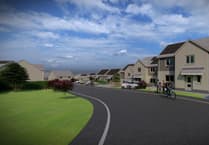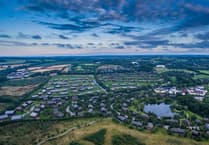A scheme for a 200-foot-high wind turbine to power a north Pembrokeshire mansion and arts charity home is being recommended for refusal despite county planners previously backing it.
Mr and Mrs Glen Peters of Western Solar Ltd are seeking permission for a single turbine on land near the Grade II-listed Rhosygilwen Mansion, which includes an arts and functions building known as Neuaddydderwen.
The application for the 62-metre-high turbine and associated works, was recommended for refusal at the March meeting of Pembrokeshire County Council’s planning committee, having been deferred at the January meeting, pending a site visit.
The application, backed by committee members at the March meeting, was initially recommended for refusal in January for several reasons, including potential harm to the setting of the Grade-II-listed house and grounds, and fears of threats to the safe operation of West Wales Airport at Aberporth in neighbouring Ceredigion, some 9.5 kilometres away.
The last concern was later withdrawn.
Applicant Glen Peters has said the application for a turbine was “made on both financial and ideological grounds,” to ensure the long-term viability of Rhosygilwen, acquired some 30 years previously as a fire-damaged house that was about to be pulled down.
He said that, despite 200-year-old Rhosygilwen using power from its solar farm, the first of its kind in Wales, along with ground source heating a biomass power, it was hit with “huge increases in importing energy from the grid” during the winter months.
As the March backing of the plans went against officer recommendation, members backed it on a ‘minded to’ approval, the application returning to the April 23 planning meeting for ratification after a ‘cooling off’ period.
In papers ahead of the April meeting, the scheme is again recommended for refusal, on the grounds the proposal “would not protect or enhance the setting [of Rhosygilwen] but rather would result in significant harm to this interest of acknowledged importance”.
A report for members says: “Members should be aware that if they are minded-to approve the application on the basis of economic and social benefits, this is a consideration which can be applied to many other proposals.
“This would have further consequences for the implementation of policies within the LDP and its delivery. This would include undermining the protection afforded to the historic environment, most notably listed buildings, as set out [by policy].
“The planning balance required to be met, whereby the need for development is assessed having regard to the impact on the environment, would be adversely affected.
“The importance of environmental protection, in this case the protection of the historic environment, would be devalued and the importance of limited economic and energy benefits would be overvalued.”
It also warns that the proposal “may set a precedent for harm to an interest of acknowledged importance by a development having limited economic or energy-generating benefits”.




